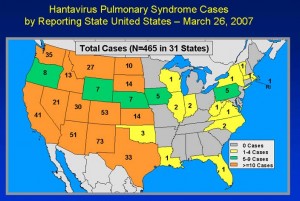Hantavirus Pulmonary Syndrome
Description: Hantavirus Pulmonary Syndrome is a virus. Rodents shed the virus in their urine, droppings and saliva.
Cause: The Hantavirus strain present in the Northeast (called “New York-1”) is spread by wild mice, specifically the deer mouse, Permoyscus maniculatus, and the white-footed mouse, Peromyscus leucopus. Both may invade homes. (Rodents that spread other Hantavirus strains in other areas include the rice rat and the cotton rat.)
Rodents shed the virus in their urine, droppings, and saliva. The virus can then become airborne, and people catch it by breathing in these microscopic particles. It’s also possible, although less common, for someone to catch the disease from the bite of an infected rodent. If you touch an object that’s contaminated with rodent urine, droppings, or saliva and then touch an open wound or your eyes, you could also become infected. It may be possible to catch the disease by eating food or drinking water that’s been contaminated by mice.

Symptoms: The first signs of sickness, especially fever and muscle aches, appear 1 to 5 weeks after exposure, followed by shortness of breath and coughing. Once this phase begins, the disease progresses rapidly and hospitalization is often needed within 24 hours.
Treatment: Patients receive supportive treatment, often in the intensive care unit, and antibiotics to prevent secondary bacterial infections.
Other Facts:
- Toys, silverware, and such items can be disinfected, but it’s best to discard contaminated foods, drinks, napkins, paper plates, or cups.
- There are several good reasons to exclude mice from your home. They spread diseases, such as Hantavirus. They chew on wires and sometimes make their nests in fans or vents, which could lead to fires. They may destroy insulation and cause your heating and cooling bills to increase. Once they’re removed, repairs may be needed to ensure that they can’t get back in.

 Receive FREE wildlife Tips!
Receive FREE wildlife Tips!
